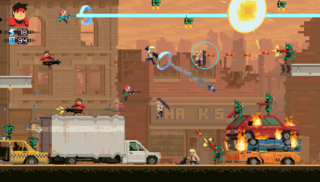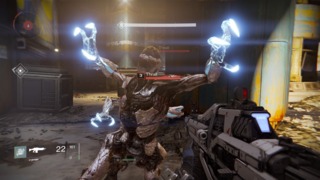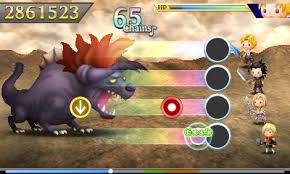Monthly Roundup, September 2014
By majormitch 4 Comments
Following last month’s short break, school raged on in September, becoming busier than ever. Only by pure circumstance am I able to keep up with video games at all; this fall looks to be the lightest fall in decades when it comes to video game releases. Still, keeping up is going to be a challenge, and I did what I could during the month. I played a few hours each of a few different games, and have some thoughts to share about them. One game I spent even less time with was Sportsfriends, which I played about an hour of with some friends. We sampled the three non-motion games (sorry Johann Sebastian Joust), and I found it to be a decent collection of multiplayer games. HOKRA was easily my favorite of the bunch, as I found it immediately intuitive and fun. Super Pole Riders was really goofy in an entertaining way, though something about BaraBariBall didn’t click with me. It was the game I expected to like the most, but I just never got comfortable with the controls/physics in the short time I spent with it. I’ll hopefully try it all again someday, after which I might have more to say. At any rate, below are the games I played a nontrivial amount of in September.
Super Time Force Ultra

Super Time Force made its way to PC (picking up the “Ultra” moniker along the way) just before the fall picked up steam, and I quickly squeezed it in when I had the chance. It’s not a long game by any stretch, but I’m still glad I got around to it when I did. I’m additionally glad because Super Time Force is a fun game. Its core idea is robust enough to produce plenty of entertaining moments; the whole notion of your previous character repeating your actions after you die is supremely clever. If you haven’t seen it in action, it can be kind of hard to explain, but it basically allows you record a bunch of runs and stack them on top of each other. This can be used to all sorts of effects, from stacking damage from multiple characters at once, to coordinating characters to take down different enemies simultaneously. The different characters you unlock all have different abilities too, and I feel like the game is at its best when it leverages those abilities to create more puzzly scenarios. This most prominently occurred for me via Shieldy Blockerson (a guy with a… shield), who can be used to defend certain areas while your other characters fire from safety. You can come up with some neat stuff if you want. The game also has separate challenge rooms that limit both the characters and the number of rewinds available, which lead to some pretty devious challenges. It’s good stuff.
The main drawback is that I did find Super Time Force to wear thin at times. Many of the characters aren’t unique enough to really bother with; I imagine everyone will end up relying on a relatively small “toolbox” set of at most 3-5 characters (I primarily used only three characters). On top of that, many scenarios simply require you to deal a lot of damage in a short amount of time, which devolves into the tedious process of summoning in more characters to rotely shoot at a thing for a few seconds, over and over. I think the good easily outweighs the bad, however, making Super Time Force a fun time.
Destiny

Destiny is a weird game; I still don’t know what to make of it. Sometimes I think it’s totally alright, and other times I think it’s just a bad game. It’s been a roller coaster of conflicting feelings thus far, and I think my unusual struggle to settle my thoughts on the game goes a long way in indicating just how weird it really is. At times Destiny echoes Halo, Diablo, Borderlands, World of Warcraft, or even Animal Crossing… sometimes all at once. And yet, it never really channels the best aspects of any of those games, nor does it establish an identity all of its own either. There’s no thing about Destiny, no clear aspect that one can point to and say “See that? That’s Destiny.” Destiny is a first person shooter from the makers of Halo, but its campaign and story are, quite bluntly, abominations. Destiny contains loot and RPG mechanics like Diablo or Borderlands, but those mechanics are so light that they almost feel like afterthoughts. Destiny creates a persistent world for players to inhabit like a MMO would, but that world is bafflingly devoid of meaningful content. Furthermore, Destiny generates mundane public/world events in attempt to engage and/or reward those that choose to live in its world. It reminds me of how games like World of Warcraft or Animal Crossing do similar things to make their worlds feel alive, and Destiny’s efforts feel cold and lifeless by comparison. Everything Destiny does has been done better elsewhere, and while it’s tempting to say Destiny’s "thing" is that it tries to pull all of these features together in one space, I don’t think its loose assembly of poorly executed pieces is strong enough to justify the combination. Destiny is your extreme example of "jack of all trades, master of none", and it suffers for it; I would get a lot more out of both my time and my money by playing a polished game that does any one of those things exceptionally well.

All of this has me thinking that I’ve ultimately landed on the “bad game” side of the divide. Destiny’s combat and audiovisial presentation are the only things I think it does well, and while those are very important core pieces, they’re neither unique nor good enough to carry the game all on their own. Let’s face it; while Destiny controls great, I’ve played plenty of other FPS’s that control just as well, and then surround those controls with trappings infinitely better than Destiny’s. Great combat by itself isn’t enough for a modern FPS, and I could say the exact same about how the game looks and sounds. Big budget games in 2014, especially of the ever popular FPS variety, simply play, look, and sound fantastic. It’s the dressing that often makes the difference, and Destiny’s dressing is a boring and repetitive grind. The game seems to expect players to have an innate desire to exist in its world indefinitely, yet gives them hardly any meaningful reasons to do so. I was bored of the game well before finishing the “campaign”, but I’ll at least try the Crucible, and perhaps get a taste of the endgame content before moving on (which seems to be even more of a tedious grind, despite everyone claiming it gets better). Otherwise I don’t know that I have much Destiny left in me, but we’ll see how it goes.
Theatrhythm Final Fantasy: Curtain Call
Sequels are a tricky business, but there’s something to be said for sequels that all but make their predecessor obsolete. It’s hard to fault a game that improves upon the core of what came before it (even if only slightly), and then proceeds to pile so much content onto that core that you’re left wondering how they got away with making so little the first time around. Even better is when they say “to hell with it” and just include the entire first game within the second anyway. That, in a nutshell, is Theatrhythm Final Fantasy: Curtain Call’s approach to sequels. It takes the already solid core of the original Theatrhythm Final Fantasy, makes a few tweaks to address some issues fans had with it, and then unloads the content. Theatrhythm had 70-something songs; Curtain Call has over 200. Theatrhythm had 29 playable characters; Curtain Call has 65. Theatrhythm focused solely on the first 13 numbered Final Fantasies; Curtain Call adds Final Fantasy XIV and about a dozen spinoff games to the mix. Curtain Call’s quests are substantially longer, there are about twice as many trophies to collect, and it adds a competitive multiplayer mode. And I’m willing to bet there will be a lot more DLC for Curtain Call than there was for Theatrhythm… assuming they don’t run out of music to sell.

The best part about the enormous content and feature boost is that all of the songs and characters that were in the original are also in Curtain Call (even most of the original’s DLC is in Curtain Call from the start). This makes Curtain Call a strictly better game than its predecessor, and as much as I have a soft spot in my heart for that first Theatrhythm and the novelty factor it held that can’t be replicated, it certainly is now obsolete. As for the tweaks Curtain Call makes to improve the formula, they’re mostly minor, but all welcome. First, after a short tutorial period, you are given access to almost every single song and all three difficulties right off the bat. No longer do you have to slog through lower difficulties or play those silly “Dark Notes” to play all the songs on the highest difficulty; Curtain Call gives you the reins almost immediately. Second, there are new button control options if you want them. I still prefer the feel of the touch screen controls, but I could see the button settings having their own appeal. Everyone can play it how they want. Third, the Quest Medleys are a noticeable improvement upon the Chaos Shrine from the first game. The game’s RPG elements are still predominantly superficial, and they remain the one aspect of the game that doesn’t really click. But the quests are both lengthier and more varied than the awful Dark Notes ever were, making grinding for unlockables much less of a downer.
Ultimately, however, in spite of all the additions and tweaks, what makes Curtain Call a good game are the same things that made the original so damn fun: good rhythm fundamentals and wonderful music. Tapping and swiping continues to feel natural and precise, and the greatly expanded soundtrack contains even more of what’s among the best music in video game history. To be honest, what I enjoy most about the game is simply going into the standard play mode and jamming through a series of my favorite battle themes on the highest difficulty. It’s intense, satisfying, and a ton of fun. But Curtain Call is a big game, and there are a lot of other viable ways to engage with it. I think that’s its best attribute, and what ultimately makes it a better game than its predecessor (loss of novelty aside). Anyone who likes a solid rhythm game or great video game music would likely find something to enjoy in Theatrhythm Final Fantasy: Curtain Call, and I know it’s a game I’ll happily be coming back to for quite some time.
Looking Ahead to October
October will no doubt be another busy month in school, but as I mentioned before, 2014’s fall release schedule isn’t exactly daunting. I’ve already conceded that Middle-earth: Shadow of Mordor will have to wait until later (which is a bummer, as the game looks cool), but otherwise I’m going to try and keep up with the season’s big releases as best I can. For October that primarily means Civilization: Beyond Earth, which is easily the month’s most exciting game for me. Against my better judgement, I also just picked up Super Smash Bros. for Nintendo 3DS. I probably would have been better off waiting for the Wii U version, but I do really want to play the new Smash; Nintendo got me again. There are a few other curiosities coming out in October, but nothing critical. I’m also going to try and squeeze in Valiant Hearts: The Great War if I can, which I already own via a recent sale. That’s probably more than enough for my limited gaming time, but we’ll see how it goes!
